#neurodiversity in classic literature
Explore tagged Tumblr posts
Text
You know, I think you can actually interpret Odysseus as having ADHD. The impulsivity, the stubborn focus on a single goal while still getting distracted by so many piddling little goals, the deep loyalty to the people he cares about while holding complete and utter contempt for those who hurt or wrong them, the intense depressive episodes when he feels like he’s failed his crew and his family (especially when he’s stuck with Calypso on Ogygia)…there’s a reason I like to make a comparison between Odysseus and Luz. And yes, that includes Amity being Penelope and Manny being Anticleia and Camila being Laertes.
@lady-asteria @disregardcanon @dachi-chan25 @cynicalclassicist @carcosa-commune
I will never understand how Odysseus has all the braincells while also having none of them at the same exact time. He is an amazing war general and is insanely smart but has the attention span of a rat fuelled by the need to cause chaos simply because he is bored. He can't listen to one thing while getting distracted by the thing he was specifically told not to touch.
#Odysseus#The Odyssey#ADHD Odysseus#depression mention cw#rats cw#mentions of war cw#Odysseus x Penelope#The Owl House#Luz Noceda#Amity Blight#Luz x Amity#Lumity#Camila Noceda#Manny Noceda#caps cw#ADHD#neurodivergence#neurodivergent#neurodiversity#neurodiversity in classic literature
3K notes
·
View notes
Text
Book Talk #2: The Mind of Jay Gatsby
A traditional reading of The Great Gatsby focuses on what the novel teaches us about class, bigotry, and the American Dream. It's an important reading, but one that is already well worn. I'm going to assume you are already familiar with it and/or can research it when you feel like it. But this post is not about that reading.
I want to talk about the characters of The Great Gatsby, not as devices to advance theme or plot, but as whole, fleshed out people who are still compelling a near century after being written. So I ask...
What makes Gatsby tick? Why is he the way he is? He has a perfectly normal problem: he wants this girl. He has an absolutely puzzling solution. Throw massive parties. Let’s investigate.
Some people think it’s just the premise of the book, and must be accepted. Some people take Nick Carraway’s view, that Gatsby’s gift for hope is to be romanticized, admired, and protected. I don’t. I think that Jay Gastsby is neither some tragic hero or a plot premise to remain unquestioned. Upon my most recent reading of The Great Gatsby, I discovered a new headcanon that better explains his behavior than any I’ve heard before.
Jay Gatsby is autistic.
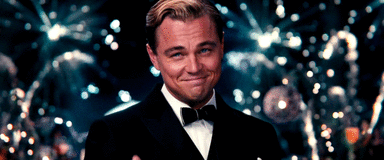
Yes I’m playing armchair psychologist. No I’m not qualified. It’s fine, because this a fictional character. Also, it’s a good conversation starter. I’m not the first to think of this (shoutout to tumblr users @thegreatgatsbyglitters & @confirmedpsycho, and @thegreatsandwich on aO3) but it’s not often discussed. It gets far less discussion than the “Nick is gay” reading (which I also buy). So let’s see if we can remedy this.
So the CDC lists the DSM-5 diagnostic criteria for autism. It seems as good as any place to start.
The three main requirements are as such:
Persistent deficits in social communication and social interaction across multiple contexts, as manifested by the following, currently or by history (examples are illustrative, not exhaustive; see text):
Deficits in social-emotional reciprocity, ranging, for example, from abnormal social approach and failure of normal back-and-forth conversation; to reduced sharing of interests, emotions, or affect; to failure to initiate or respond to social interactions.
Deficits in nonverbal communicative behaviors used for social interaction, ranging, for example, from poorly integrated verbal and nonverbal communication; to abnormalities in eye contact and body language or deficits in understanding and use of gestures; to a total lack of facial expressions and nonverbal communication.
Deficits in developing, maintaining, and understanding relationships, ranging, for example, from difficulties adjusting behavior to suit various social contexts; to difficulties in sharing imaginative play or in making friends; to absence of interest in peers.
And compare them against the evidence in the book
1. If throwing giant parties to attract the attention of your beloved isn’t “abnormal approach,” I don’t know what it. Furthermore, when Gatsby decides to escalate attempts, he decides to ask Jordan Baker to ask Nick if he will have Daisy over for tea so Gatsby can drop in.
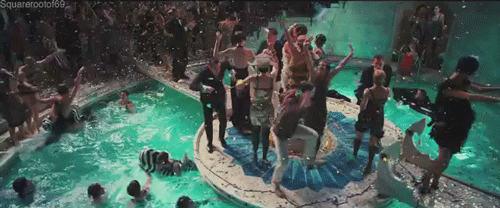
Pictured Above: A perfectly straightforward and reasonable way to get a girl's attention
2. This is most prominently seen in chapter six. Tom and his two riding friends, the Sloanes, arrive at Gatsby’s house on horseback unannounced. Gatsby invites them inside, which is declined. Mrs. Sloane then invites Nick and Gatsby to a dinner party.
Gatsby looked at me questioningly. He wanted to go and he didn’t see that Mr Sloane had determined he shouldn’t.‘I’m afraid I won’t be able to,’ I said. ‘Well, you come,’ she urged, concentrating on Gatsby.
Here, Nick is flat out telling us that the invitation was only extended to be polite, and that Gatsby didn’t realize this. He heard the words, and failed to notice all the other social cues that were saying he shouldn’t accept. He accepts the invitation.
3. Difficulties in adjusting behavior to suit various social contexts. Gatsby has a hard time interacting in a friendly, social setting, and treats a lot of his encounters like business deals. Here’s a clear example.
Nick has just agreed to host Daisy for dinner, just as Gatsby requested. Gatsby then proceeds to offer Nick the chance to make some money. Gatsby sees this as repaying the debt he owes to Nick, and has a hard time comprehending that Nick is doing a favor for a friend.
‘Well, this would interest you. It wouldn’t take up much of your time and you might pick up a nice bit of money. It happens to be a rather confidential sort of thing.’
I realize now that under different circumstances that conversation might have been one of the crises of my life. But, because the offer was obviously and tactlessly for a service to be rendered, I had no choice except to cut him off there.
A diagnoses also requires two of the following four:
1. Stereotyped or repetitive motor movements, use of objects, or speech (e.g., simple motor stereotypes, lining up toys or flipping objects, echolalia, idiosyncratic phrases).
2. Insistence on sameness, inflexible adherence to routines, or ritualized patterns of verbal or nonverbal behavior (e.g., extreme distress at small changes, difficulties with transitions, rigid thinking patterns, greeting rituals, need to take same route or eat same food every day).
3. Highly restricted, fixated interests that are abnormal in intensity or focus (e.g., strong attachment to or preoccupation with unusual objects, excessively circumscribed or perseverative interests).
4. Hyper- or hyporeactivity to sensory input or unusual interest in sensory aspects of the environment (e.g. apparent indifference to pain/temperature, adverse response to specific sounds or textures, excessive smelling or touching of objects, visual fascination with lights or movement).
Gatsby fits all four.
The strongest evidence I saw for this is that Gatsby says “Old Sport” a lot.
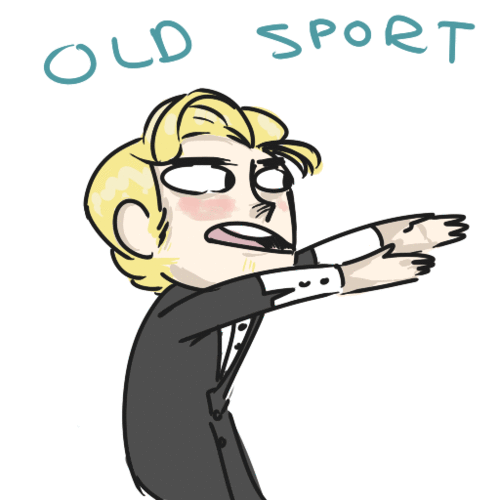
2. We find evidence for this right at the end of the book. Gatsby’s dad shows a schedule Jay made for himself as a teenager. It plots out his time from 6AM to 9PM.
3. This should prove to be the most controversial subclaim in this post. Some people with autism fixate on trains. Some fixate on dinosaurs. Many autistic people have a singular, overriding interest. I argue that Gatsby’s autistic fixation is Daisy, or rather, the idea of her.

4. Hypersensitivity to sounds. Gatsby spends a remarkably little amount of time at his own parties. He usually is happy to leave the raucous festivities to others. He just hosts. One way to interpret this is an aversion to loud noises, often common for people on the autism spectrum.
One other thing, Gatsby is a bad liar. Holes in in backstory emerge throughout the book as he tells it to Tom or Nick. Furthermore, he can’t even convincingly tell Nick that he was the one driving the car that killed Myrtle. Nick figures out pretty quickly that it was Daisy. This supports a reading of autistic Jay Gatsby because many autistic people don’t realize all the nonverbal signs that give away liars, so they can’t fix them in their own performance when they try to lie.
Why does it matter?
First off, representation matters, but it also affects the themes of the story. His pining over Daisy becomes much less romanticized and much more pitiable. In chapter one, Nick describes Gatsby -
It was an extraordinary gift for hope, a romantic readiness such as I have never found in any other person and which it is not likely I shall ever find again.
More objectively, it could be described as the curse of hope, haunted by a nostalgia for things that never were, and a future that can never be. It is a ceaseless need for the unattainable, a self inflicted torture that can end only varying degrees of sorrow. In this way, The Great Gatsby becomes not just a story of themes and ideas, but of realistic people.
It explains why Gatsby refuses to accept that the past cannot be repeated, that Daisy has a new life and is oblivious to the fact that Nick is in love with him (like I said earlier, this interpretation makes a lot of sense to me).
The first time I read this book, it was a story about the American Dream, about prejudice, and about love. It still is all that, but now, I also see a story about flawed human beings, and about how we all, for better or worse, run amok, changing the course of each other's lives. Seeing all this on a subsequent reading encourages me to read more carefully in the future, to distrust narrators (don't implicitly accept their point of view), and be more quick to notice what kind of people are involved in the story. There are queer and neurodivergent characters in places you might not expect, including the foremost novel of the jazz age.
And if you still don’t believe this theory, I encourage you to mindfully read the book again. It’s not long. You will probably even find evidence I overlooked. Besides, you’re probably overdue to reread it anyway.
#the great gatsby#nick carraway#jay gatsby#autsitic#autism#neurodiversity#neurodivergent#literature#erasure#representation matters#media representation#classic literature
37 notes
·
View notes
Text
⛧𓋹⛧𓋹⛧⛧𓋹⛧𓋹⛧⛧𓋹⛧𓋹⛧⛧𓋹⛧𓋹⛧⛧𓋹⛧𓋹⛧⛧𓋹
𝑇𝐻𝐸
𝑆𝐻𝐴𝑃𝐸𝑆𝐻𝐼𝐹𝑇𝐸𝑅
ᚠ ᚢ ᚦ ᚱ ᚲ ᚷ ᚹ ᚺ ᚾ ᛁ ᛃ ᛇ ᛈ ᛉ ᛋ ᛗ ᛏ ᛜ ᛚ
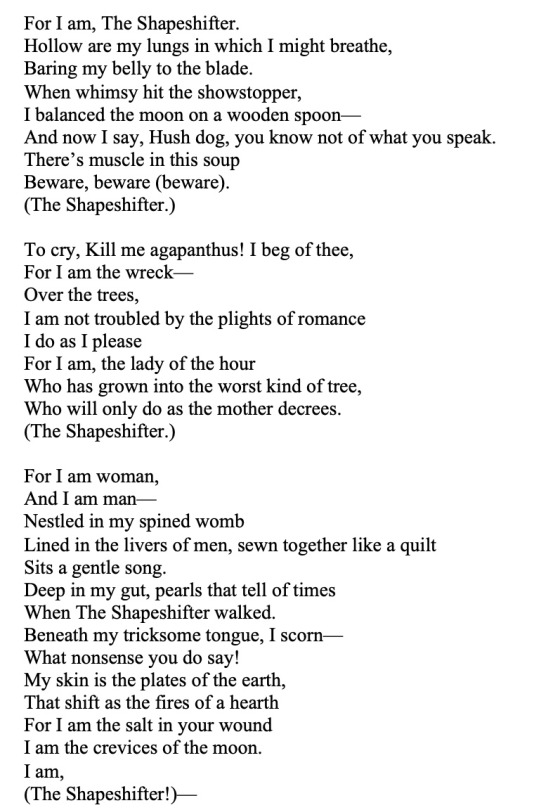
I greet thee dear, welcome to my blog. I am The Shapeshifter, The Wizard Goose, Plague upon John of England *menacing honking*. I am a Witch and a feral beast. I spend these days in which I suspend casting runes, spitting tricksome prophecies and harassing the English monarchy. How I have come here I know not, but joyous I am to converse with thee. I hope thou may find a thing of sorts here, whether it be comfort, whimsy, disturbance or perhaps the cup of dice.
𓋹
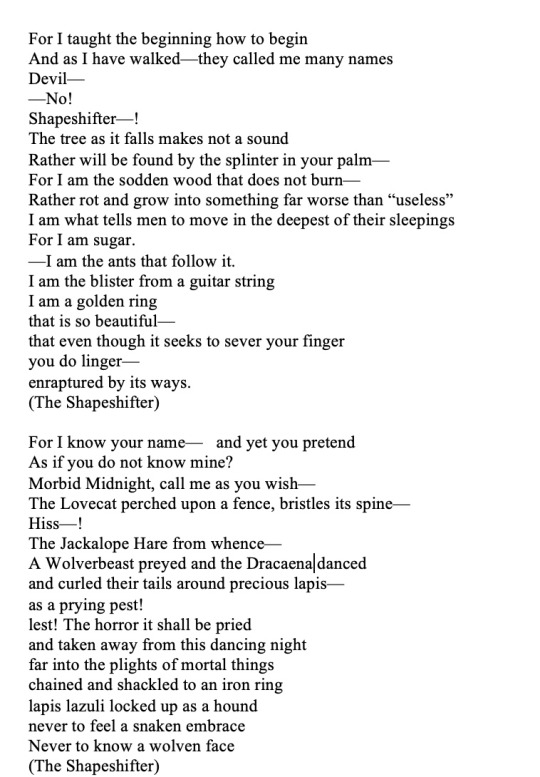
𓋹
I am called many names. Shapeshifter. Versipellis, Gestaltwandler, ilcruthach, Vormveranderaar. All words meaning Shapeshifter. As well as Werewolverine, Lovecat, Dracaena, She-wolf and Jackalope Hare. These names I did snatch into my claws while doing historical, mythological, folkloric and etymological research. If you wish to know the etymology and history of these names look upon this post
🕸️What art thou to call me? however you please. Choose one in the previous list or assign me thine own title. As long as it is done with respect I shalt answer. To be given a name is a great honour. 🕸️
⛧𓋹⛧𓋹⛧⛧𓋹⛧𓋹⛧⛧𓋹⛧𓋹⛧⛧𓋹⛧𓋹⛧⛧𓋹⛧𓋹⛧⛧𓋹
I fall under the definition of nonhuman, I take many forms. Most notably a goose. Much of the posting thou may see upon here is I, The Mighty Goose, Plague upon John of England violently honking or screeching in Shakespearean. I often find myself taking forms such as that of a siren, Dracaena, Wolverine, Harpy, Jaguar, Bin Chicken, Hyena and jackrabbit. The forms in which I might take are boundless as the ways of water across this sphere. For I am whatever I please.
ᛐᛜᚢᚦ
☾ I bear connection to mythological and folkloric shapeshifters, as to be they are ballads of myself or perhaps a close friend ☽
My gender is fluid. The pronouns I do favour art he/she/it, preferably alternating between the three as I cannot be confined by one singular. I am polyamorous and queer. OOooOooOh hOnK hOnK
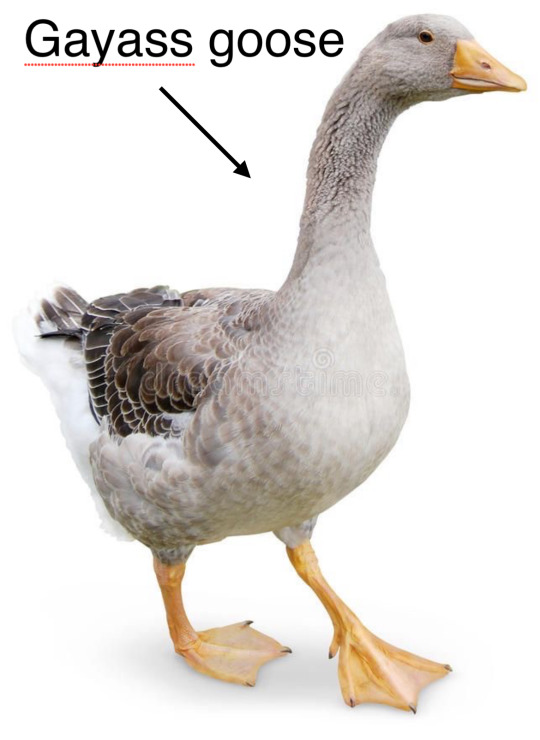
As of now I am writing The Shapeshifter. A ballad describing my identity. Here you may find what of it has been released. For the past four years I have been crafting a novel series. It is influenced by folklore and mythology, containing queer, nonhuman and disabled characters.
𝑃𝑂𝐸𝑇𝑅𝑌 𝑆𝐴𝑀𝑃𝐿𝐸𝑆
The Shapeshifter's lament (part of the Shapeshifter)
The Shapeshifter
Vivamus Moriendium Est
Fight Dog
The Verdict
𝑀𝑌 𝑁𝑂𝑉𝐸𝐿
Lore
Character intro
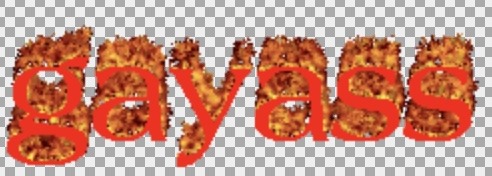
I am disabled and neurodiverse. I have FND, tourettes and POTs and I am a cane user (in need of a wheelchair but unable to access). I have OCD, ADHD, sensory processing and likely autism. I will often post about disability advocacy on this blog. I am apart of the goth subculture (my favourite bands art The Cure, Inkubus Sukkubus, Sisters of mercy, Bauhaus, Scary Bitches, Coctaeu twins). I am interested in classical literature, History, Folklore, Paganism, vulture culture, Etymology, Shakespeare and gothic horror. I will on occasion post images of my goth makeup upon this platform. I art a minor, be freaky and thou shalt be CURSED I say! grime of a chicken hearted mutt upon thee for thou art liver bellied and foul as a cattle foot in a yew stump.
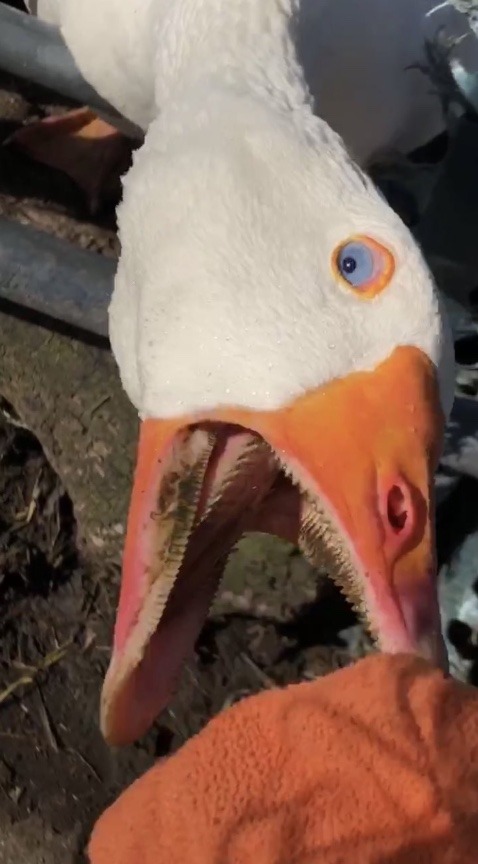
ReQUESTS (honk)
The Challenge of the goose, tis a challenge where I the tricksome goose shalt grant thee a riddle. Simply request for one in mine ask box or say "I call upon the challenge of the goose". I will trial thee with a riddle I have written, if thou does succeed I shalt grant thee an honorary goose title.
In addition if thou art curious about my writing, identity as a shapeshifter or wish to ask me any questions, do so. Tis no reason for shame, inquiry and curiosity about what we do not understand is a wonderful thing.
Goth resources
Boundaries:
I AM A MINOR!!!! I will not private message with adults, adults can interact with my blog but private messaging is off the table. DNI: perverts and bigots. I don’t mind images of dead animals as long as it isn’t a dead goose. Please don’t send me pictures of dead, injured or cooked geese.
Tags:
#the shapeshifter's riddles : my poems
#morbid lore : to do with my ongoing ye olde goose feud with the entirety of Britland.
#challenge of the goose: answering riddle requests
#morbid memes: memes I have made myself (as seen below, mostly to do with geese)
#morbid's gaggle : interactions with moots
#morbid midnight : I tend to tag all my posts under this tag.
#morbid Reblogs
And now I must return to unionising the cows under lesbianism against John of England. Upon thee I wish plentiful fruit, soft sun upon thine cheek, much bounty and many adventures to seek. May the skin of your palms be coarse to the Strike of a bramble. So says The Shapeshifter
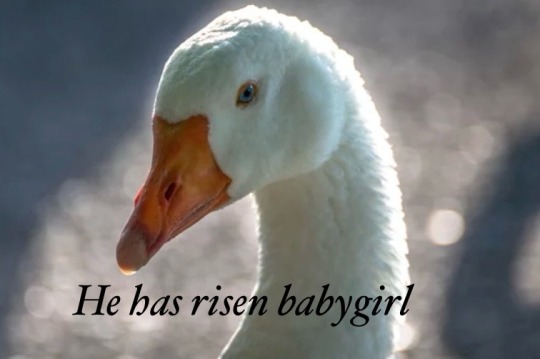

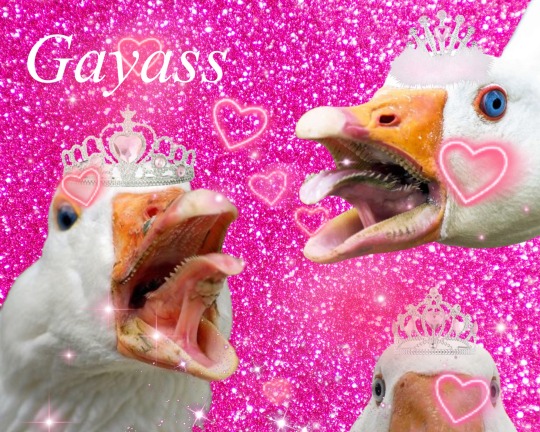
#the shapeshifter's riddles#morbid's memes#morbid lore#morbid's gaggle#morbid midnight#the challenge of the goose#honk#goose#silly goose#etymology#history#neurodivergent#nonhuman#otherkin#tics and tourettes#disabled#intro post#get to know the blogger#shapeshifterkin#get to know me#queer#poets#writers#writers on tumblr#novel writing#writer stuff#queer writer#queer poetry#therian poetry#writeblr
34 notes
·
View notes
Text
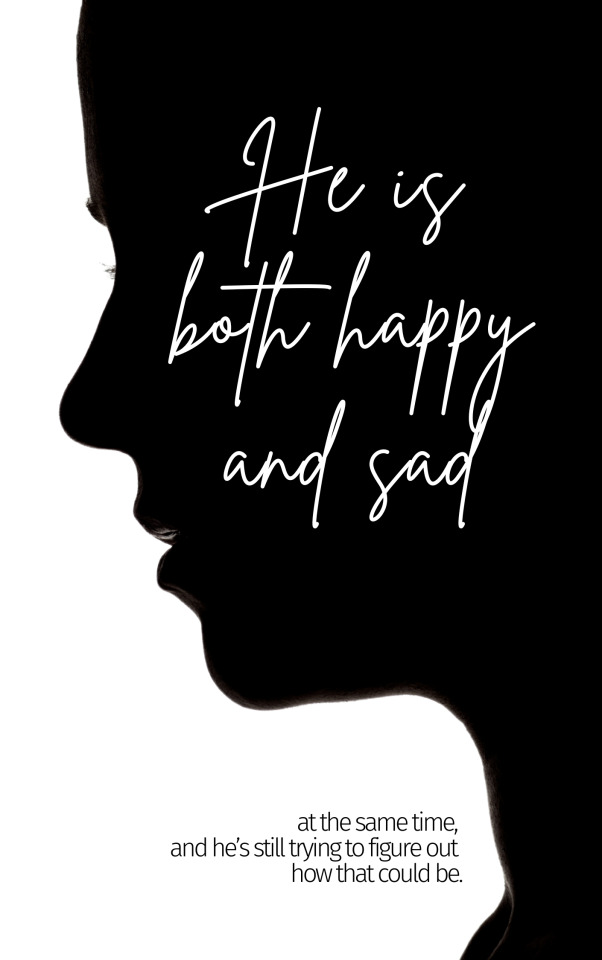
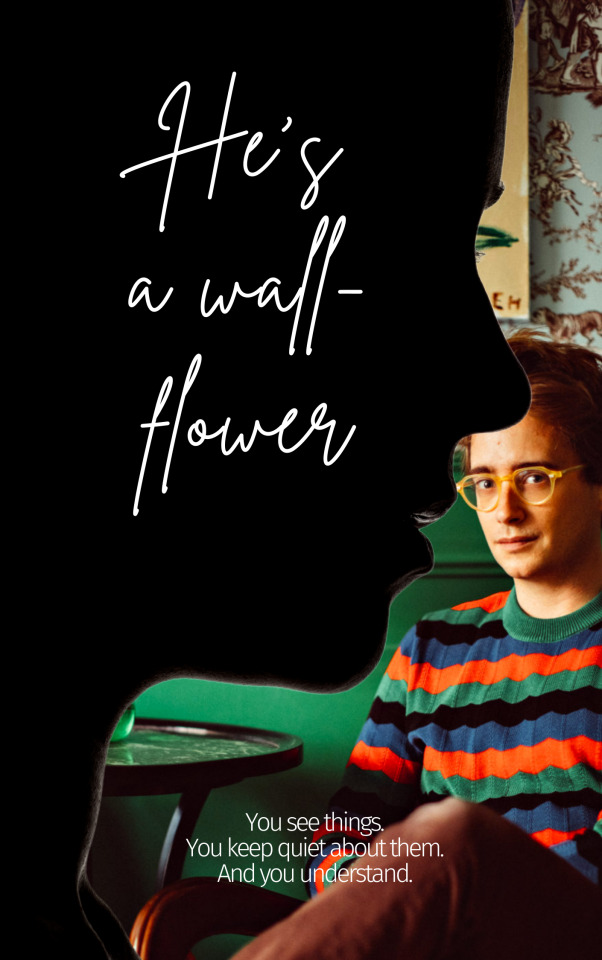

Finn Kensington, a 26-year-old psychology enthusiast, is currently pursuing his Ph.D. at the prestigious University of Cambridge. His motivation to study psychology is deeply personal, fueled by his unique family dynamics and personal struggles.
Finn faces the challenges of navigating life on the autism spectrum. His journey is not only an academic pursuit but a personal exploration of the mind, influenced by his experiences with his father and brother. His father, also on the autism spectrum, and his bipolar brother have been the driving force behind Finn's commitment to understanding and unraveling the complexities of the human mind.
Finn's academic journey is a testament to his resilience and passion for psychology. Through his studies, he seeks not only to unravel the mysteries of the human mind but to contribute to a better understanding and acceptance of neurodiversity.
Beyond the realm of psychology, Finn is an avid literature lover. His love for books serves as a refuge, providing solace and inspiration in the midst of academic challenges and personal reflections. Whether lost in the pages of classic novels or contemporary works, literature is his companion on the journey of self-discovery.
selective | semi-active | mostly active on among us | open for smalltalk, writings (only among us) & plotting | eng/ger | fsk21+ | tw: incest, mental struggles
43 notes
·
View notes
Text
The autism metaphor really speaks to me.
Day 30: How would you sum up Alice in one word?
Wondrous. The books do give you a sense of wonder above all else, and it is wonderful to see the MANY different interpretations of said books (I.E. among other things I've seen interpreted as a metaphor for autism).
And if you were to watch the 1933 Paramount version, that would be a vastly different experience to watching the 1988 Czechoslovakian version or the 1999 Hallmark film or the 1951 Disney version. They're all vastly different experiences which goes to show just how different and wondrous interpretations of these books can be.
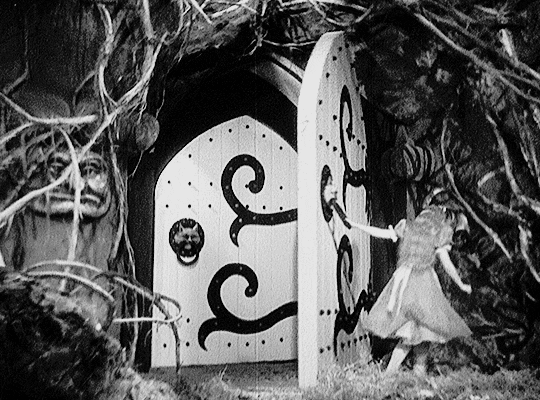



#alice in wonderland#alice's adventures in wonderland#through the looking glass#30 day alice challenge#books#classic literature#Alice in Wonderland 1933#Alice in Wonderland 1999#Alice in Wonderland 1951#Disney#Paramount#Hallmark#Alice 1988#autism#neurodivergent#autistic#neurodiversity#allegory#i always thought of alice as autism coded#maybe that explains why i like the disney movie so much#autism coded#alice challenge#disney alice in wonderland
8 notes
·
View notes
Text
Being neurodivergent is so funny
Like I read a book in tenth grade English and my brain said this is gonna be your entire personality for the rest of your life
#yes this is about Frankenstein#frankenstein#shitpost#meme#neurodivergent#neurodiversity#literature#books#bookblr#classic lit#classic literature#gothic lit#am i funny and relatable
97 notes
·
View notes
Note
I’d love to hear your lgbtq+ book recs!!
I hope you have a lovely weekend as well!
well now you've opened pandora sabrina's box asgdbhjq
okay firstly, lemme just link u to some recs we've previously compiled in the studyblr w/knives server: top 2021 books, lgbtq+ main character, trans main character (more recs incoming next month ;))
and now, to single out some recent(ish) faves: (cut bc this is long)
exciting times (n. dolan) - contemporary fiction they say this is the closest it gets to sally rooney but i haven't read any of her books so i wouldn't know about that. i would, however, know that i absolutely love the writing in this one - barely anything happens and i rarely like plotless books and yet here i am, tabbing the hell out of this book
gideon the ninth (t. muir) - sci-fi horror fantasy it took a little for me to get used to the writing but oh. my. god. it destroyed me in the best way possible and i already have the sequel on my shelves, waiting till after finals to dig in (very much recommend it - feel free to dm me and i can tell u more)
the charm offensive (a. cochrun)* - contemporary rom-com this had the lovely vibes red, white & royal blue has; i read it in a day and had a blast, it also has a main character of color and neurodiverse rep!
the six of crows duology (l. bardugo) - ya fantasy you surely already know abt it, but it's among my all time absolute faves so of course i have to mention it
the raven cycle (m. stiefvater) - ya urban fantasy same reason as with soc lol
things have gotten worse since we last spoke (e. larocca)* - conteporary epistolary horror horror indeed. chilling, gripping, delightfully horrifying and fucking disgusting - i probs won't ever be rereading but man, it was a ride
damaged like us (b.&k. ritchie)* - contemporary romance is this the height of literature? certainly not. but did i enjoy it and read it at lightning speed? i did. i really did.
the house in the cerulean sea (t.j. klune) - urban fantasy a hug in book form. reading this feels like being bundled up in ur fave blanket, sipping your fave hot beverage and Vibing™
hepdale rain trilogy (c. paul)* - ya urban fantasy i don't like werewolf stories. these books tho? had me in a chokehold. the characters are amazing, the writing is lovely af, and each book is better than the last.
the atlas six (o. blake)* - urban fantasy some ppl hated this but me? it made me go absolutely insane. i was making inhumane noises as this took my heart and twisted it in like 5 diff dimensions, 5 stars, immediate new fave.
top secret (e. kennedy, s. bowen)* - contemporary romance kinda a frat house you've got mail au. shameless smut ngl. a great pick if u just want sth quick, super non-demanding to read while getting over a book that ruined u lol
him (e. kennedy, s. bowen)* - contemporary sports romance same as the previous, just with the hockey gays flavor this time.
cemetery boys (a. thomas) - ya urban fantasy this. book. asdfsdghfjkl. my poor heart. just sweet and so soft, but at the same time amazing at tackling themes like your identity and belonging and culture and
simon vs. the homo sapiens agenda (b. albertalli) - ya contemporary romance a classic by this point, but i read it in 2018 and def wanna reread :')
heartstopper (a. oseman) - ya contemporary romance the graphic novel that stole our hearts <3 also go watch it on netflix everyone (if u want to Emote be consumed by warmth)
the magic between (s. hoyt) - magical realism romance this wasn't exactly a fave, but the dedication reads "for all the bisexuals out there - this one's for you." and yes. the bisexual rep this world deserves
*contains (varying degrees of) graphic sexual content
okay i'll stop with that for now, feel free to ask for more literally any time. but bc i cannoT shut up and you have been warned, here are some fantastic lgbtq+ books i have on my tbr (recs courtesy of my friends with superb reading tastes):
the darkness outside us (e. schrefer) - ya sci-fi romance my preordered paperback is on its way as we speak
in the dream house (c. m. machado) - non fiction a memoir that apparently doesn't read as non fiction and tackles multiple incredibly important topics
if we were villains (m. l. rio) - contemporary mystery i won't even say anything, this has been on my tbr for 6 years and that's that.
summer sons (l. mandelo) - urban fantasy (magical realism?idk) this was pitched to me as "the raven cycle but darker and more unhinged". sold immediately lmao
heated rivalry (r. reid) - contemporary sports romance hockey gays with a lot of angst
crush (r. siken) - poetry
iron widow (x. j. zhao) - sci-fi
the starless sea (e. morgenstern) - urban fantasy
19 days (o. xian) - manga
the gilded wolves trilogy (r. chokshi) - historical fantasy
if you have any recs for me (any genre), definitely do drop them in my asks or dms and if you ever run out of books of a specific genre to read or just wanna scream about a book, you know where to find me ✨
#(most of the books i recced in the previous ask are also lgbtq+)#right now i'm most excited to read the darkness outside us and heated rivalry#books#lgbtq#lgbtq+#book recs#bookblr#sabrinas posts#sabrinas mail#sabrinas other
31 notes
·
View notes
Text
SLASHER IDENTITY HEADCANONS! [PART 2]
PART 2 WOO!!! so basically just characters i couldn't fit in the other one. same things apply, a lot of projection and whatnot, dont argue with me plssss thank u <3
✨SFW!! - DOORS OPEN, COME ON IN!✨
TWs: slight talk of religion, mention of various phobias
Danny "Jed Olsen" Johnson / Ghostface -📸
Pronouns: They/He + neos
Gender Identity: AMAB Demiboy
Sexuality: Omnisexual, GNC pref
Birthday: 2nd April 1974
Height: 5'9
Neurodiversity: Divergent (ADHD, Dyslexic)
Phobias: Nosocomephobia - fear of hospitals, Ranidaphobia - fear of frogs
Likes: Neon red, the weirdest starbucks drinks they could possibly get their hands on, cats, photography, old cameras, punk pop, punk, trad goth, metal, really any kind of alt music that sounds grainy, chunky animals
Dislikes: Mainstream music (he's just quirky like that /s), anything medical, slimy animals, small fast animals, overly religious people
Pyramid Head -🗡️
Pronouns: Any, preferably He/They/It
Gender Identity: None but physically masculine
Sexuality: Doesn't care
Birthday: Doesn't have one really
Height: 8'3
Neurodiversity: Typical (technically??)
Phobias: None
Likes: Rough textures, small animals, dipping it's hands in cold liquid, being acknowledged as a being rather than an object
Dislikes: Religious iconography, churches, high frequency noises, harsh lighting
Richie Kirsch -📹
Pronouns: He/Him
Gender Identity: Cis Man
Sexuality: Bisexual
Birthday: 24th April 1996
Height: 6'3
Neurodiversity: Divergent (ADHD)
Phobias: Trypophobia - fear of small holes, Thalassophobia - fear of the ocean
Likes: Horror movies, 90's tech, arcades, male manipulator music (i refuse to call it anything else), 90's fashion, just the 90's in general tbh, vinyls (he 100% collects rare and valuable vinyls and is a total snob about it)
Dislikes: Hyperpop, people who use the term "male manipulator", spearmint, seafood, boats, whatever tadpoles have going on like what is up with that
Edward Nashton / Riddler -❔
Pronouns: He/They + neos
Gender Identity: Trans Man
Sexuality: Bisexual, male pref
Birthday: 21st July 1993 (reject canon, canon sucks anyway /j)
Height: 5'11
Neurodiversity: Divergent (Autism, ADHD, Dyslexia)
Phobias: Athazagoraphobia - fear of being forgotten, Autophobia - fear of being alone, Theophobia - fear of religion
Likes: Jigsaw puzzles, riddles, the crosswords that are in newspapers (they hit different trust me), sickly sweet smells, leathery textures, rats, The Batman, coding, that stupid ave maria song that has been stuck in my head since i watched the movie, gameshows, male manipulator music
Dislikes: Authority, whatever the Gotham PD had going on, the upper class, church, plain coffee, the texture of most crisps, large crowds, leaving his apartment
Bruce Wayne / Batman -🦇
Pronouns: He/They + vampire neos
Gender Identity: Agender, AMAB
Sexuality: Omni, female pref
Birthday: 19th February 1991
Height: 6'1
Neurodiversity: Divergent (Autism)
Phobias: Atychiphobia - fear of failure, Thanatophobia - fear of death
Likes: Bats, shitty vampire media, Nirvana, the edgiest music you've ever heard, makeup, dim lighting, the cold, contemplating life in the darkest corner of his basement cave, comfy clothes, black nail polish
Dislikes: Whatever the Gotham PD had going on, formal/fancy clothes, wearing ties, going out in public, bright lights, canvas fabric, having to talk about his past, injustice
Dr Otto Octavius / Doc Ock -🧪
Pronouns: He/It
Gender Identity: Cis Man
Sexuality: Pansexual
Birthday: 24th May 1957
Height: 6'2
Neurodiversity: Typical
Phobias: Cleithrophobia - fear of being trapped, AI-phobia - fear of artificial intelligence
Likes: Classic literature, space, new technology, engineering, quantum physics, teaching, ABBA, he's just a big science nerd tbh, sci-fi, coffee
Dislikes: sweet tasting things, fantasy sci-fi, cartoon logic, technology that has been built incorrectly or inefficiently, being told something is impossible without proof, damp textures
[PART 1]
#danny johnson#danny jed olsen johnson#dbd ghostface#dbd#dead by daylight#pyramid head#silent hill#richie kirsch#scream 2022#edward nashton#edward nygma#the riddler#dano!riddler#bruce wayne#batman#the batman 2022#battinson#doc ock#doctor octopus#dr otto octavius#spiderman 2#spiderman no way home#slashers#slasher headcanons#superhero headcanons#supervillain headcanons
20 notes
·
View notes
Text
I know I tend to express a fairly negative outlook on trusting professionals to understand, or even recognize, neurodiversity, especially in those of us who don’t present as the most classic, stereotypical form of our type of neurodiversity. This comes from both personal experience as an autistic woman and the experiences of many others. However, I’ve been looking at a lot of academic research on autism/neurodiversity lately in the course of my PhD work, and I have to say, despite coming across some eye-rollingly oblivious and sometimes even dangerous studies, the picture as a whole is still leaving me feeling surprisingly optimistic. Why? Because when I look at the development of common themes/topics/assumptions/interpretations over the years, e.g. comparing work published around 2000 vs 2010 vs 2020, I see increasing amounts of:
1) researchers asking autistics/other ND people what matters to us, and some trying to include a wide range of autistic perspectives, even from those who have more difficulty communicating
2) respect for the language people use to describe themselves
3) acknowledgement that camouflaging/masking is a real thing that real ND people do that comes with both benefits and significant costs
4) focus on understanding the interaction between gender and neurodiversity, as well as race/ethnicity/national origin/income/other factors and neurodiversity, and how these things affect both access to services and the usefulness of the services provided
5) calls for improved support throughout the lifespan, including critical evaluation of the usefulness of various sources of support for people with various characteristics and abilities at various points in their lives
6) respect for self-advocates and for the neurodiversity movement
This isn’t to say that all of the problems are solved. A lot of this work is still emerging. Some researchers still cling to old, harmful beliefs. Many others are doing their best to update their understanding but still lack a lot of the knowledge they need, and have too many competing priorities to focus on learning these things. Even the best in the field don’t even begin to have all the answers, although they, at least, are usually aware of that fact. Meanwhile, most professionals practicing in the relevant fields are several steps removed from all of this emerging research, and many were trained long before it was even a topic of interest in the academic community. However:
1) The increasing number of articles on these topics, and the fact that these articles are getting published, shows that the academic perspective on neurodiversity is shifting in a more inclusive and respectful direction.
2) The more of these articles that are published, the more the professors training future professionals are exposed to these emerging ideas, and the more these ideas seep into the way they teach future professionals about their future clients.
3) These new professionals then go out into the field better able to serve their ND clients and advocate for ND issues (or at least not actively work against ND issues), as well as to educate other professionals who may not have kept up with current research due to being immersed in their day-to-day work. This gradually increases the understanding of neurodiversity in the field as a whole.
4) The body of research has gotten large enough that it’s making its way into literature designed to keep practicing professionals informed of current issues, even when they aren’t able to keep up with the research literature. This moves the perspective on these issues away from the pet problem of a few random researchers towards a general consensus in the field.
So our problems aren’t solved yet, but they aren’t hopeless. Change has been slow, but it’s gaining momentum, and I think we’re going to see some significant improvements in the coming years. Some people are even already benefitting from those improvements, including me. I’m sure it won’t be as much as we’d like, or as fast as we’d like, especially given the number of people who need things to get better now, not later, but at least we aren’t stuck this way forever. Change is on the horizon, and that’s something to celebrate.
#autism#neurodiversity#rain has Opinions#but those Opinions are increasingly based in Facts#rain's ramblings
40 notes
·
View notes
Text
Literary Agents Accepting Queries 2020
A note; these agents are according to my research as of June 12, 2020. To find more information on these agents, just look up their name and agency. How to query to these agents differ, so it would be wise to look into them more. Bolded is the categories, genres, and/or tropes that said agent is interested in. This list was put together by me, and it was only the agents who’s name start with A. Even though this is labeled as YA, many of these agents are interested in other genres.
* Adria Goetz (Martin Literary Management), Mill Creek, WA General fiction Suspense/thriller Fantasy/science fiction Juvenile fiction Religious
* Adriann Ranta Zurhellen (Foundry Literary + Media), New York, NY all genres and for all age groups, but has a penchant for edgy, dark, unusual voices, unique settings, and everyman stories told with a new spin. She loves gritty, realistic, true-to-life narratives with conflicts based in the real world; women’s fiction and nonfiction; accessible, pop nonfiction in science, history, and craft; and smart, fresh, genre-bending works for children.
* Adrienne Rosado (Stonesong Literary Agency), New York, NY adult and children’s fiction, as well as select non-fiction in the areas of pop-science, business, memoir, and humor. In both adult and children’s fiction, she is looking for contemporary, mystery, historical, thriller, fantasy, and anything with a wickedly dark sense of humor. She’s especially drawn to multicultural fiction, lgbtq+ works, and stories about people from atypical walks of life. She is not currently looking for poetry or children’s picture books.
* Agnes Carlowicz (Carol Mann Agency), New York, NY both fiction and non-fiction, with a special passion for literature that amplifies underrepresented voices and subverts the status quo. Among others, she enjoys: intersectional feminism, millennial self-care, female-driven memoir, true-crime, and humorous pop culture.
* Aimee Ashcraft (Brower Literary & Management), New York, NY busy seeking out stories that feature all-encompassing worlds and compelling female characters. She loves books that are told from an original point of view and are more addictive than a good Netflix binge
* Albert Longden (Albert T. Longden Agency), Bloomfield, NJ (AAR Member) General fiction, Mystery, Romance, Suspense/thriller, Fantasy/science fiction, Biography, Business/investing/finance, Sports, Paranormal (want writers that are preferably experienced and are willing to listen to productive critiques of their work)
* Albert Zuckerman (Writers House), New York, NY books in all adult categories, fiction and non-fiction. And lately I’ve been enjoying working with some YA and Middle Grade authors. I'm interested in working with a few more novelists, literary and commercial
* Alec Shane (Writers House), New York, NY mystery, thrillers (though he’s experiencing terrorist fatigue at the moment), suspense, horror, historical fiction, literary fiction, and middle grade and young adult fiction. He DOESNT want Romance, straight sci-fi, high fantasy, picture books, self-help, women’s fiction, food, or travel memoir.
* Alex Glass (Glass Literary Management), New York, NY General fiction, Mystery, Suspense/thriller, Juvenile fiction, Biography, History, Mind/body/spirit, Health, Lifestyle, Cookbooks, Sports, Literary fiction, Memoir, Narrative nonfiction, Pop culture
* Alexa Stark (Trident Media Group), New York, NY drawn to literary debuts with a unique voice and perspective, stories about dysfunctional friendships and families, edgy coming-of-age tales, character-driven suspense and thrillers, and fiction that delves into the surreal
* Alexandra Levick (Writers House), New York, NY Picture book author-illustrators, a wide range of middle grade and YA, and more speculative-leaning or genre-bent upmarket adult works. I’m committed to working with writers from diverse backgrounds and am looking to put forth a list of outstanding creators who will be able to provide windows, mirrors, and sliding glass doors (thank you, Dr. Rudine Sims Bishop) into all kinds of experiences. I’m particularly looking for own-voices stories about historically underrepresented characters, identities, and cultures.
* Alexandra Machinist (International Creative Management), New York, NY Commercial fiction Literary fiction Upmarket women's fiction Historical fiction Suspense Fantasy Young adult Middle grade
* Alexandra Penfold (Upstart Crow Literary), New York, NY specializes in young picture books, middle-grade fiction, and young adult
* Alexandra Weiss (Jennifer DeChiara Literary Agency), New York, NY contemporary, magical realism, and light SFF. I’d also like to see more rom-coms that make my heart feel warm. dedicated to representing marginalized creators and diverse books, including #ownvoices. I’m actively seeking LGBTQIA+, POC, gender fluid, neurodiverse, and disabled voices for all age ranges and across all genres.
* Alexis Hurley (InkWell Management), New York, NY domestic works in the areas of literary and commercial fiction, memoir, narrative non-fiction and more
* Ali Herring (Spencerhill Associates), Lakewood Ranch, FL I’m open to all YA: Contemporary, fantasy, sci-fi, speculative, horror, romance, issue books (though I have a few already on my list so not my top choice), etc. All the contemporary fantasy right now. Contemporary with a speculative element YA suspense/thrillers All the horror right now, or horror-bordering Anything with an edge Fun teen romance like To All the Boys I’ve Loved Before Vibrant Teen rom-coms Dystopian or failing Utopia/Utopian worlds (fresh government or control system in place or none at all) Near-future dystopian where the world is not cleaned up and pretty. I want a sense of the horror but without tons of gore. Bold unexplored settings
* Alice Martell (The Martell Agency), New York, NY Open to all/most Genres Excluding: Fantasy, Science Fiction.
* Alice Speilburg (Speilburg Literary Agency), Louisville, KY In YA Fiction, I'm looking for diverse retellings of classic stories, stories rooted in mythology, contemporary fantasy with magical/supernatural worlds alongside our own (but not necessarily "urban," rural & suburban magical systems could be nice). Across the board, I'm looking for an inclusive cast of characters, across gender, sexual orientation, race, religion, and mental health spectrums.
* Alice Tasman (Jean Naggar Literary Agency), New York, NY Alice's fiction tastes, for young adult and adult books, ranging from commercial, literary fiction and history to thrillers and suspense, and women's fiction.
* Alicia Brooks (Jean Naggar Literary Agency), New York, NY she is looking for Memoir, Narrative Nonfiction, Self-Help, Pop Culture, Literary Fiction, Commercial Fiction, YA Fiction, Mystery/Crime, and Historical Fiction
* Alison Picard (Alison J. Picard Agency), Cotuit, MA Adult fiction and non-fiction, children's and young adult NO: short stories, poetry, plays, screenplays or sci-fi/fantasy.
* Allison Hunter (Janklow & Nesbit Associates), New York, NY literary and commercial fiction, especially women's fiction, as well as memoir, narrative nonfiction, cultural studies and pop culture. She is always looking for funny female writers, great love stories, campus novels, family epics, smart beach reads and for non-fiction projects that speak to the current cultural climate
* Alyssa Jennette (Stonesong Literary Agency), New York, NY children’s and adult fiction and picture books, graphic novels, and select pop culture nonfiction. She values diversity and inclusion; in fiction she enjoys ensemble casts with distinct voices, stories about poor characters and communities, and formats that are specific to a story and give it its own context. Alyssa is particularly interested in art/art history/art conservation, archaeology, mythology, language/translation, and criminal justice reform
* Alyssa Reuben (Paradigm Literary and Talent Agency), New York, NY adult, young adult, and the occasional middle grade fiction as well as smart, platform driven, nonfiction ranging from pop-culture, lifestyle, cookbooks, and narrative to memoir. She gravitates toward voice-driven non-fiction presenting a fresh point of view and particularly loves novels with an edge or a great romance arc.
* Amanda Leuck (Spencerhill Associates), Lakewood Ranch, FL contemporary and speculative fiction that explore social issues, YA fantasy based in mythology across cultures, historical novels that spark my need to know more, characters with disability, chronic illness or mental illness - that doesn't necessarily drive the plot, #ownvoices, women and girls in STEM, romantic plots and subplots that surprise me, LGBTQIA+ characters, the intersection of science and religion, or magic and convention, where what is real is not clear, animal and ecological themes
* Amanda Rutter (Red Sofa Literary), St. Paul, MN Open to a broad Audience, including: Adults, Middle grades, Young adults. Fantasy. Science fiction.
* Amelia Appel (Triada U.S. Literary Agency), Sewickley, PA For YA, she is particularly interested in stories with a savvy protagonist and a slightly dark tone that deal with serious coming-of-age issues well.
* Amy Elizabeth Bishop (Dystel, Goderich & Bourret, LLC), New York, NY Fiction-wise, I'm interested in both upmarket and literary women’s fiction, mysteries, and fiction from diverse and underrepresented authors. I'd love more literary fiction from women of color. I'm choosy about my historical fiction, preferring it voice-driven and female-centric, focusing on the stories of those that history has largely chosen to not tell. [[A bit tuckered out from American Revolution, Civil War, WWII, and Vietnam War, so I'm not really looking in that space.]] I'm always interested in stories that are not set in Western Europe or the East/West Coast. I'd love to see more speculative fiction/light horror, though I'm not as interested in science fiction or fantasy in the adult space at this time. I'm also looking for a literary thriller/literary suspense a la THE TWELVE LIVES OF SAMUEL HAWLEY or BARBED WIRE HEART. In YA: would love a smart contemporary rom-com that isn't just boy meets girl in high school (or if it is, it has to be a seriously new story), a fascinating, creepy retelling in the vein of Carmen Maria Machado, and light horror. I'd love to find a multi-generational story and am particularly interested in the intricacies of family (and sister!!) relationships. I'm a sucker for stories that take place in closed environments (like boarding schools) and though I appreciate romantic elements, I'm also eager to see narratives where a happy ending for women isn't necessarily a relationship. #ownvoices, always, please. Anything with some serious creep to it!
* Amy Brewer (Metamorphosis Literary Agency), Kansas City, MO She’s seeking: Romances of all kinds; if your plot revolves around love or angst or both, send it to her. She is also looking for general fiction, LGBTQ+, women’s fiction, book club reads, and quirky humor.
* Amy Jameson (A+B Works), New York, NY loves children’s literature, and is actively seeking Middle Grade and Young Adult projects.
* Amy Rennert (The Amy Rennert Agency), Tiburon, CA General fiction Mystery Biography Business/investing/finance History Mind/body/spirit Health Lifestyle Sports Literary fiction Narrative non-fiction especially memoir and reportage
* Amy Stapp (Wolfson Literary Agency), New York, NY Mystery/suspense Contemporary romance Contemporary coming-of-age Historical fiction Southern Gothic
* Amy Stern (Sheldon Fogelman Agency), New York, NY Summer camps, boarding schools, reality television, kids who are in some way extraordinary, puzzles, puns. I really love stories that involve close family relationships that both enhance and complicate the protagonists' lives. I want to see more mental illness stories that aren't just about diagnosis and LGBTQIA+ stories that aren't just about coming out.
* Andrea Barzvi (Empire Literary), New York, NY General fiction Romance Suspense/thriller Juvenile fiction Biography Business/investing/finance Mind/body/spirit
* Andrea Somberg (Harvey Klinger), New York, NY Upmarket fiction (i.e., bookclub fiction) that has a twist or sheds light on an intriguing issue Novels that explore cultural heritage YA or Adult novels that are based on a true story from the 20th century YA contemporary love stories/romantic comedies Epic fantasy, especially ones set in a non-Western culture, military sf or space opera Magical realism for the adult, YA or MG market. YA and MG novels that feature diverse protagonists YA psychological thrillers MG mystery novels MG novels that are funny and are illustrated MG or YA novels that'll make me cry Nonfiction for MG or YA audiences Any novel with great characters and a compelling storyline Unique nonfiction
* Andy Ross (Andy Ross Literary Agency), Oakland, CA (AAR Member) narrative non-fiction, history, politics and current events, science, journalism, cultural subjects. We also work with literary and young adult fiction
* Angela Rinaldi (The Angela Rinaldi Literary Agency), Los Angeles, CA (AAR Member) I am actively looking for fiction commercial, literary, mainstream women’s fiction, multicultural, suspense, book club fiction – novels where the story lends itself to discussion.
* Anjali Singh (Ayesha Pande Literary), New York, NY Her interests are wide-ranging and include literary as well as popular fiction, young adult, women’s, African-American and international fiction. She is also seeking authors of nonfiction, including biography, history, popular culture, cultural commentary, and memoir. She is particularly drawn to distinctive, original voices.
* Ann Behar (Scovil Galen Ghosh Literary Agency), New York, NY searching for wonderful children's books, from picture books to YA, ever since. I am looking for anything that is beautifully written, with a strong, distinct voice and characters that come alive on the page. Ideally, a book should grab my attention from the very beginning and hold it there, and leave me thinking about it for a few days after I am finished.
* Ann Rose (Prospect Agency), Upper Montclair, NJ YA of all genres: But especially stories that have heart and humor. I want you to transport me to new worlds--even if those "worlds" are in the middle of Iowa. But especially if its fantasy, I really want you to take me there and show me something I haven't seen before. I'd love some fantasy that's based on something other than western cultures. I'm always looking for strong character who are willing to stand up for their convictions--whether it be with their brains or their brawn. Give me fabulous friendship stories (and some no so fabulous ones). LGBTQIA+ stories!!! I'd still really love a story where two girls are running against each other for class president and then they fall in love. In both YA and MG I don't shy away from stories that deal with issues kids are dealing with today. I will say, if you are going to discuss topics like suicide make sure you've done your homework--proper language matters. I'd love to see more YA thriller--not necessarily gore but a story that keeps me on the edge of my seat, guessing until the very end. I'm still looking for my YA version of CLUE (and if it has three different endings, even better.) Which means mystery is a go for me, too. I'd love some YA that deals with toxic masculinity. A funny how to survive high school book with tips and tricks how to make the most out of your four years would be good. Show me characters who are beautifully flawed doing the wrong things for all the right reasons. Give me body positive MC's. Unique sports books--crossfit, ultimate Frisbee, rock climbing, mountain biking, roller derby, and even speed walkers. Oh, and twins - good twins, evil twins, twins that get along, twins that don't, rom-coms where twins switch places and hijinks happen... anything goes. Historicals that tackle things other than WW2--bonus points if there are badass women in in history.
* Anne Bohner (Pen and Ink Literary), New York, NY commercial women's fiction, romance, YA and popular nonfiction.
* Anne Hawkins (John Hawkins & Associates), New York, NY (AAR Member) Fiction of all sorts, non-fiction (contemporary journalism, history, biography, etc.), juveniles (although primarily young adult and middle grades, since we don´t specialize in illustrators, but having said that I should add that we represent several of the best), science-fiction and fantasy.
* Anne Tibbets (Red Sofa Literary), St. Paul, MN Right now, she's acquiring YA and Adult: Thrillers, Mysteries, Horror, Romance, Science Fiction, Fantasy, and Historicals.
* Annelise Robey (Jane Rotrosen Agency), New York, NY women’s fiction, romance, historical fiction, YA, fantasy, mystery, and suspense, and is always looking for exciting new voices in fiction
* Arielle Datz (Dunow, Carlson & Lerner Literary Agency), New York, NY (AAR Member) She is looking for literary and commercial fiction (mostly adult, some YA), featuring unusual stories and voices.
* Ashley Lopez (Waxman Literary Agency), New York, NY Ashley is looking for literary and young adult fiction, narrative nonfiction, memoir, and cultural criticism. Most importantly she seeks authors with a strong point of view and an eye for language.
This is the end of my fist alphabetical list of agents accepting queries in 2020. I hope this list was helpful to you, and wish you good luck in your querying!
#writeblr#writblr#writing advice#writing tips#query#queries#querying#writing resources#publishing#isabellaspeaks
71 notes
·
View notes
Text
Pip Rambles - Help Wanted
Finally got my new laptop updated, and I really love it.
Mike Wazowski, my old laptop, served me well. He lasted almost 8 years before he started to run too slowly to keep up with online teaching and software updates. He’s still a great computer otherwise, though. So, he’s definitely sticking around. I’m really glad he’s still so functional because I’d have a really hard time parting with him.
After 8 years of owning a thing, and being autistic, you get really attached. He’s seriously like my little brother or something.
Not sure that non-neurodiverse people do this, but I name fucking everything. I have names for my furniture, my notebooks, and even some of my pens. [I have a fountain pen named Bob Cratchit that I used to address all my wedding invitations. I have 2 sets of Midliner markers/highlighters that are named after the Capulet and Montague clans. I had to replace some of the highlighters when they “died” and I was sad. My work set is clan Montague and my personal set is clan Capulet. You get the picture.]
So, TLDR: I need a new name for my new computer. See below the cut for more info about names I’ve already thought of, if you want to help/comment.
My special interests include: Gargoyles, Classic Literature from all continents and time periods (Shakespeare is a particular favorite), all animation, the Muppets, folk music, and musical theater.
Here are some of the ones I’ve thought of in no particular order:
1) Paine or TP (After Thomas Paine)
2) Jesper (Like the character/ I really like the way this name sounds)
3) Baggins (Obvs.)
4) Jay (Like the bird and the sports team)
5) Jo (Like the character from Little Women)
6) Everdeen (Like the character)
7) MacDuff (Like the character)
8) Puck (Like the character)
2 notes
·
View notes
Text
hi. op here. I wish I wasn’t reblogging this bc I deleted this post years ago after receiving hundreds of replies hyper-analysing my post, and while I always appreciate critical thinking it was getting exhausting. it feels very stupid & very chronically online of me to be replying like this (yet again) but here we go. mutuals pls ignore me
@teabooksandsweets that first bit is literally what I meant to say. I guess I worded it wrong, or too many people took a generalisation too literally, but that was completely what I intended. I start an English Literature degree in September and the idea that I’m a part of this rancid wave of tiktok-fuelled anti-intellectualism makes me want to cry. I love literature. literature of different eras, cultures and genres. I was just fed up of feeling stupid when I went to read classics and I didn’t want any other readers to feel alone in that. they’re generally more difficult, but obviously that depends on the book and the reader. inherently so bc language & culture has changed since the time of writing. obviously that shouldn’t prevent people from enjoying & learning from them; in fact, those differences are what make them so valuable.
clearly all of the nuance of these ideas couldn’t fit into quick tumblr post but I thought the strong wording would give my ideas emphasis. there’s got to be a middle ground between all classics being the “greatest books of all time” with zero critical thinking about their flaws, contexts or varying ideas of what the literary canon is (or the fact that there are other ways of being educated on history and the human experience) & all classics being stupid propaganda torture machines everyone was made to read at school.
(btw the “vocabulary and pop culture knowledge of an 18th century nobleman” was a joke/exaggeration about how some classic books require very specific knowledge in order to fully understand what the writer is saying.)
nothing in my og post actually said anything discouraging… if you look then all I said was “it’s okay not to like things” but I think bc of this wave of anti-intellectualism it’s been perceived as part of that category. idk. the whole point of saying “you’re not stupid if you find reading a classic novel more difficult” was to ENCOURAGE readers to feel good about reading classics & take their time/ do research if they want to.
everyone. read books! or don’t. neither one makes you a better person. there are other ways to educate yourself about history, politics and other human experiences (TV, movies, audiobooks, academia, etc) and acting like it’s a requirement disregards the intelligence of many neurodiverse people who find it especially difficult. but please, please, learn, and keep learning, and think critically about everything you come across.
I wish everyone would admit that classic literature is inherently difficult to read, and that you shouldn’t feel stupid if you don’t “get it”. Especially the dark academia/ classic lit fandoms and stuff. Like unless you have the vocabulary and pop culture knowledge of an 18th century nobleman, it’s going to be a tough read. It’ll take you longer to read; you’re not stupid if you’ve spent several months on a single book! And you don’t have to enjoy everything. It’s okay if you got bored after one chapter of Wuthering Heights, and couldn’t be bothered to read the rest. It’s okay if you want to read your favourite kids book for the 10th time instead. You’re not stupid. No piece of literature is inherently better, more “important”, more “meaningful”, or more “intellectual” than another. First and foremost, read what brings you joy.
#all of this is very cringe of me . sorry . I know I shouldn’t be taking disagreements so personally#but it was a post I wrote aged 15 and now it’s got 70k notes like wtf . I’m not good at dealing with all this online discourse#I get sucked in too easily & people arguing w me online makes me want to explode . literally THOUSANDS of ppl not understanding what I meant#it got reposted on Reddit once and they all thought I was some brainless anti-intellectual who only read for the AeStHeTiC 😭😭😭
77K notes
·
View notes
Text
Tip Sheet: 5 Ways to Shake up Retellings
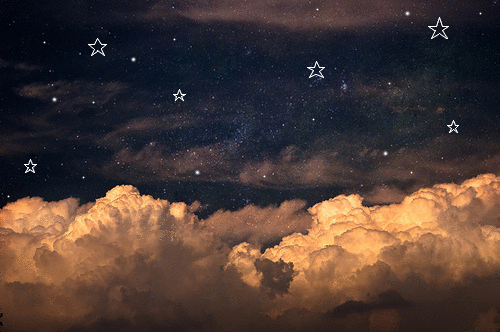
Say you're a writer who's got a myth, fairy tale, or other legend you've always wanted to write about. You love the message, you've got some great characters, and ideas to deepen the plot are already pinging around in your brain. But you look around the market, your stomach sinks, and anxieties attack. Why?
The market is awash with retellings.
Every month there seems to be a new retelling on the new release list. Which makes me a happy reader, but makes the writer in me quiver with fear. *Insert Scar gif here.* Well, not so much fear, but anxiety. With all of these amazing books coming out, with strong and varied voices, based on the same tales you, or I, may want to write about, it's enough to intimidate any writer.
So what can a writer do to make a retelling stand out?
Good question and one I'll tackle in this post. Welcome, dear readers, as I talk about 5 ways to shake up a retelling and put your stamp all over it.
The writing market is a terrifying place. With new books coming out all the time, it's easy to be dissuaded from writing a story you truly love for fear that someone else is doing it and doing it better. But as many an experienced writer, editor, and agent can tell you: writing for the market is the worst idea ever. Why? The market changes. All. The. Time. Vampires are still taboo even though “Twilight” was years ago. Fantasy is at an all time high but magic schools are a tough sell thanks to “Harry Potter.” Dystopians have had their day thanks to “The Hunger Games” and “Divergent” series, although if there's a fresh angle, there's a chance of a sell.
My point is, if you're writing for the market, you're never going to finish anything and no one wants that.
There are themes on the rise, though. Diversity is one. There's a clamor for books with good representation. Books written by AoC (authors of color) and LGBTQA+ folks are also in demand. Neurodiverse leads are wanted. More marginalized voices are heard everyday. It's amazing, it's awesome, and I'm totally a fan. So when you sit down to write your retelling, remember that your voice hasn't been heard yet. Stamp your voice all over your story, make it something only you can write. To do that, I've got some suggestions to help.
1. Mash up Tales
Say you like “Cinderella” but you also like “Tatterhood.” You think things through in your word dump and realize retellings based on “Cinderella” are so popular you could name 3 off the top of your head. But what if you mixed the tale of the girl with the glass slipper with the story of an ugly girl who has to save her sister from trolls? I'm already itching with ideas.
Taking two fairy tales, or even a tale and a piece of classic/modern literature, and mixing elements of each allows a writer to create a truly unique experience. Adding in a second tale in a retelling is less done, so that makes the story more interesting. Crossovers in a series is seen more, but crossovers are different than combinations. It's also a fun challenge to find ways to mix contrasting ideas and themes into a cohesive whole in a way that gets a writer (and reader) excited. An author has a lot of room to play and make the story their own.
2. Mess With Expectations
When I pick up a fairy tale, say, “Beauty and the Beast,” I know what I'm going to get. There's going to be a beautiful girl, a beast, magic, romance, and a message about beauty being within. So if I were to read the book jacket of a retelling and discover that's not the case, I want to know more. I want to know how that book will be different.
Changing what the reader expects is a way to bring in new ideas and fracture the story. These changes can range from altering the setting, swapping the hero and villain roles, messing with the romance, switching the genders of the leads, and a million others. All have the potential to incite curiosity in readers and give the writer a chance to tell their own story.
There is a line though, because one does have to meet some expectations of the reader, or they'll feel cheated. A writer can't just toss in a glass slipper and call it “Cinderella.” There have to be other themes that tie the two together. So be cautious when twisting expectations, but don't be afraid to experiment.
3. Tell an Untold Story
In tales like “Cinderella” and “Snow White,” there have been retellings from the wicked stepsisters or the Evil Queen's perspectives. But what about the other characters in the world? What kind of story would they tell? After the princess marries the prince, what comes next? How does the man who spent years as a transformed animal adjust to being human again? These untold stories can open the door for new perspectives on these old tales.
So many retellings stop at “happy ever after,” much like their source material, but there's so much more that can come afterwards. Remaking a story from a side character's perspective, or a villain's, has been done before but there's always room for new ideas. Reach beyond the ending, go deeper into the unforeseen consequences of the tale, and provide something fresh and new. Stories, no matter if they come from a book or reality, don't end at “happy ever after.” There's so much more to a story than an ending wrapped up in a neat little bow.
4. Do Your Research
With so many retellings coming out, it's important to keep up to date on what kinds of stories are being offered to readers. Buy, or borrow from the library, as many as possible, and read them all. We know the popular tales. There's probably a Disney movie people grew up with or another remake that has planted the image of what a particular tale is in readers' minds. So in addition to not only doing research on the fairy tale(s) you plan to retell, pay attention to what's coming out. No writer wants to copy another, that's just not cool.
Another thing to research is the plethora of tales available for retelling. A few weeks ago I did a post about the most popular tales used in retellings, and I've named them all at least once in this post. Give readers something new and fresh by researching new tales to give them. Even if the two tales are similar, such as “Cinderella” and “Allerleirauh,” there are elements that make them different, enough to create something new. So don't stick to just the familiar. Dig deeper and find something different to set you apart as a writer.
5. Make the Story Yours
I think this is the most important aspect of creating a unique and interesting story, whether it's a retelling or not. While it's always a good idea to read others' work, it's important to not be intimidated by it. Or worse, copy it.
Something drew you to write about the particular story you've chosen. Something in the message or imagery inspired you and compelled you to write. Whether this was to expand on a story or fix those elements you didn't like or just because you loved the story, you chose it. You were uniquely affected by it. So take that and run with it. Let what inspires you most about the story be the catalyst in retelling it in your own voice.
Even if you've seen a retelling similar to yours done before, remember it's not in your voice. It's not your experience. Once you find the key to making the story yours, it will set your book apart as something only you could write.
Fairy tale retellings are popular, there's no doubt about that. But there are still ways to shake things up. I hope that these ideas inspire you, whether you're working on a retelling or have a different idea that you're anxious about. In the end, remember that this is your story and that it's important to have fun and enjoy the work. Writing's hard enough without getting all tied up in knots about whether you're being “original” or not.
Thank you so much for stopping by. Please leave a comment, like, share, or what have you if you've enjoyed this post. Look for new posts every Tuesday and next week begins the first of my surprises. Take care, dear readers, and I'll see you next time.
#Laurine Bruder#writerblr#writing#amwriting#writing tips#fairy tales#retellings#originality#tip sheet
7 notes
·
View notes
Text
MANDEM Seeks Submissions for the Deaf Poets Society
Published January 20, 2017
Art Editor for the Deaf Poets Society, MANDEM is looking for thought-provoking, nuanced art from artists who identify as Deaf, disabled, chronically ill, mentally ill, or neurodiverse, particularly encouraging art dealing with the social construction of disability and works that approach this topic from an intersectional perspective.
The Deaf Poets Society is an arts and literature journal that publishes work by Deaf and disabled writers and artists. The Deaf Poets Society’s manifesto states:
We aim to create a literature of a society with a different center, where the writer with a disability is not literally seated on the floor of the writing workshop while others are seated at the seminar table, where the writer with a disability does not spend years telling stories that make others comfortable, and themselves invisible.
MANDEM’s body of work discusses the absence of respectfully-represented disabled bodies in the Western art canon, and their current Hypermobility painting series works in the tradition of classical realism to show disabled bodies as valid and beautiful.
In Issue 2, MANDEM wrote:
Self-representation matters. We believe that our bodies deserve a place in the theater of thought and that our voices (whether verbal or nonverbal) must be present in the dialogue of the art world.We believe that our bodies deserve a place in the theater of thought and that our voices (whether verbal or nonverbal) must be present in the dialogue of the art world.
MANDEM invites artists and writers who identify as part of these communities to submit their work.
To learn more about The Deaf Poets Society, please visit their website. (Originally published: http://art.fsu.edu/mandem-seeks-submissions-for-the-deaf-poets-society/)
3 notes
·
View notes
Text
Also interesting is the histories of the words themselves.
Homosexual and bisexual? They were created as medical diagnoses that encapsulated the idea that there was something dysfunctional about your gender.
Queer on the other hand, just means weird.
"But I'm not weird, that's really othering!"
That's fair, but it's not really used that way. It means unusual, out of the ordinary. There are mystical and fantastical connotations to it. Its kinda romantic.
My associations with it as a Scottish person are with Fae, or like, someone in a spooky story saying "there's something queer out there" / "there's something queer going on here, I know it" / "I feel a little... queer... *faints*"
My other association is with classic literature or period pieces. "Oh he's a little queer" would mean someone was eccentric. A (probably autistic) academic squirreled away in his study talking manically about his special interests. A woman who spends her day out in the forest collecting stones instead of courting.
Which would you rather be? A medical disorder? Or a mystical creature who's unusualness is incomprehensible to normal mortals and it scares them, but you are powerful and all they had to do to escape their doom was understand the Fae rules...
Queer is often talked about as being inclusive of between categories and those often excluded by mainstream gay discourse (bisexuals, asexuals, trans, non binary, polyamory etc). But it's bigger still than that. It welcomes the neurodiverse. It welcomes the weird. It encapsulates the fae mystasicism. It encapsulates the 60s ideal of weird as a complement, and normal as an insult. The idea that to break boundaries is good and wholesome. Its goblincore. Its galaxy brain. Its witches in the forest enjoying their spinster life. Its LSD and psychedelic music. Its theatre kids and their dress up parties.
I also think the dislike of the word is quite American. America has a much stronger sense of obligatory conformaty. Like when I think of the American concept of weirdo, outsider, I think of lonely children, isolated bitter nerds, people thrown out of their own homes. When I think of a British weirdo, I think of proper old ladies tutting like hens and just not knowing what to do about it, while the "offenders" laugh at how silly they are. I think of 60s counter culture. I think of my dad, who thought it was cool to wear a belt round his neck to hang his arm in like a sling, and who would take an orange to interviews and place it on the table without a word then take it away again at the end so that he would stand out and be remembered (now a very successful professor). I think of mad scientists and eccentrics. I think of Luna lovegood. Even "freak" makes me think of queen and sex pistols and David Bowie.
Now I don't know how accurate to real history these usages are, and the UK is perfectly capable of being violent to minorities in other ways, but these are my experiences of the word.
My girlfriend and I talk a lot about our different generations of queerness, because she was doing queer activism in the 1990s and I wasn’t.
And she’s supportive of my writing about queerness but also kind of bitter about how quickly her entire generation’s history has disappeared into a bland “AIDS was bad, gay marriage solved homophobia” narrative, and now we’re having to play catch-up to educate young LGBTQ+ people about queer history and queer theory. It gets pretty raw sometimes.
I mean, a large part of the reason TERFs have been good at educating the young and queer people haven’t is, in the 80s and 90s the leading lights of TERFdom got tenured university positions, and the leading lights of queerdom died of AIDS.
“Excuse us,” she said bitterly the other day, not at me but to me, “for not laying the groundwork for children we never thought we’d have in a future none of us thought we’d be alive for.”
125K notes
·
View notes
Text
David Chac: A Revolutionary of Finest Caliber
The dreams of our 40,000-year Neanderthalid people have finally consummated in a man born of the Heavens unto a seemingly humble estate in Philadelphia’s inner-city, gifted with a rhetorical intelligence and a K-selection allowing for a permanent perserveration of such talents even if initially to slowly mature as is true to the hypermale way. David’s Siberian-Mongolian, Ukranian-Slavonic, and High-Celtid prestiges had been the racial pathways to converge into one compass, the Hypermale Sigil, the coat of arms he bears on the shield of his battle-horse against neurodiversitarian igninanimity!
Chac’s blood is of purest blood, of Mount Asper inspiration blood, the bloodline described in Aspergian Socialism is a Science; he is the generallisimo responsible for the formative foundation of our theory.
Chac’s autobiography is thus:
A perpetual underachiever at school until his mid-teenaged years, he arose to become highest ranking in literary, comparative religious philosophical, and debating-team classes by Grade 8. His IQ was tested borderline-retarded at the age of 4 1/2 (85, with a strong visuospatial bias as to be expected by the racial correlates outlined above), unfairly taking into account r/K differentials making his maturation slow; we can safely say, certainly in the departments of philosophical and artistic intelligence, that he is a genius, as is resplendently obvious in his works.
He is an intellectual of a character unparalleled even by the Kims, for, whilst they had the benefit of a culture to acculturate and be acculturated by, he had to construct one entirely from blueprint, and a prestige, mythology, ethos, history, ethical-moral philosophy, and so forth, for the entire Aspergian school of thought, independent of Eden’s bastard concoction of neurodiversity, from scratch, starting in the 2000s. He had modelled it loosely on Mongoloid civilizations from times past, feeling it a racial fit for the proclivities of our people, to which end Cde. Sophie is in accord.
David Chac had mastered Bertrand Russel’s philosophical and fictional-scientific works at 6th grade, inspiring his writing style. He had spent his youth hobbies memorizing Catholic catchetism to which he had great youthful conviction, later moving to Pauline sect scripture per the alternative-Christian Identitarian sects, read back to forth all of Pierce’s works and listened to all of Pierce’s sermons on White Nationalist preservation, familiarized himself with all major writers of the American Renaissance such as Jared Taylor, Eugene Valberg, etc., from a young age, effectively completing his White Nationalist philosophical and historical education 6 grades earlier than graduation, allowing him to compete in a literary competition in Philadelphia in 8th grade, and gain first prize for his rhetorical rigour even if his neuromasculine style was undervalued by the incipient educational feminism growing in the system; he almost lost it to a neurotypical femalewhore’s fiction undeservingly, until a panel-judge had a change of heart owing to the learning of David’s Aspergian and thus, neurally persecuted status.
David’s victories are divine victories, David’s strategies are divine strategies; the spiritual drape of the flags fluttering atop Mount Asper are on his side.
Upon graduation, and David, despite not getting pat-on-the-back Honour roll like the intellectual invalid Chris-chan, did leave with AP Literature and AP American History under his belt both in the second-highest band grades available, as well as doing normal Honour-stream literary classes and getting the highest grade for his year, he had enrolled in a Comparative Religious Philosophy Bachelor’s degree at Montgomery Community College, only to complete 3 months owing to the errant responsibility of a corrupt neurotypical Hispaniard lecturer who had DARVO’d upon him the onus for textbooks the lecturer failed to deliver despite Chac’s payment. Nevertheless, he felt it his duty to memorize the textbooks he did receive -- enough for most classes in the two semester’s of that year, and so, effectively, in the Eugene Valberg definition of skill acquisition and not the Cuntster talisman definition of the ‘certificiate hurrhurr’, had done one year’s worth -- for reference’s and prestige’s stake, dare neurodiversitarian conditions improved enough to return to education.
They never did, allowing him to embark on his path of lifelong ideological struggle. He had expanded into Marxism and its subschools (Engels, even the dreaded Trotsky, dabbling into neo-Marxist schools before he could stomach the aberrosexual-apologism no more), Dostoevsky, Tolstoy, and other Russian existentialists and political theorists like Marxist’s contemporary enemy Bakunin, to which David took a real like to anti-work-for-work’s-sake stances; he did indeed come across Juche independently of the author, reading Kim Il-Sung’s initial seminar before Juche as a term was coined (a lengthy and not necessarily unchallenging piece if brief on grandiloquence); upon later discussion, we had found ourselves enamoured in our mutual inspiration by Juche. Later, he had learned the Dao, Confucian classics, part of neo-Confucian classics donated to him by Vietnamese neighbours, and once, we’d opened up together a copy of Mao’s “Little Red Book” only to laugh at the incongruence and logical inferiority of such neurofeminine aphorisms -- we’d written him off as a neurofemale.
Still, both Maoist and early-Soviet conceptions of womanhood as hypermale appealed to us nevertheless, so that little about these strands influenced Aspergian thought, probably most prominently.
First-wave feminism, then, is effectively a principle of Aspergian thought, contrary to Cuntster’s proclamation of “misogynist” beliefs; the Aspergian thinkers have matured in their stance of women somewhat, although ultimately maintain traditional lines on role for purely functional as opposed to traditionality’s sake’s purpose.
Aspergian women are placed prime emphasis in Aspergian society, not only owing to reproductive role and placement of reproductive prestige even if unwanted for the sake of increasing the Aspergian number alone, but in their role as investors of the kind of ideological care requisite to forming future generations of Aspergian womanhood in the style of Aspergian femininity.
David Chac once remarked,
“if neurotypical women are women because they are shit*, Aspergian women are women because they are as if flowers** had bloomed from a rock.”
*owing to their love for coprophagia as was established by both ourselves **sex-aversion is universal, irrespective of libido, owing to sensory reservations, and as such is why LagoonaBlue should be regarded suspicious owing to its promiscuous record
Aspergian women are milk and honey, prime and place in our ideology.
David Chac recognized the struggles of Aspergian women from early on.
He had brought into his household a neglected high-Celtid (French) one of high-Songbun rank in American society, a congressional lawyer’s daughter, for a while before becoming homeless. (Name undisclosed for security reasons and due to potential legal repercussions; c. 2014~16 relationship length.) She was drugged with numerous neuroleptics and antidepressants and had been given hopelessness of autonomy, her overbearing parents contributing to a suicidality they never took seriously. Ah, ever compassionate David with his loving arms, ever desired something to fix-up with his Aspergian problem solving keen! David’s sexual status, virility, selectivity viability and honour, is proven in that he attracted such woman of high caliber, if in circumstances of desperation he himself was anxious to alleviate.
Higher than anything LagoonaBlue brought home from the bushes of the Glaswegian ghetto, a fellow special-school attendee of some pathetic description still in the memory of the author from PULL. How should she be wihae Atpoejanguiuichonyeo? (Great Aspergian woman?). Her disgrace of a pig mother has been disclosed of secrets but in the author’s respect, even if she (yes, myself) disdains LagoonaBlue’s selectivity choices, won’t divulge them until a proper slight occurs as an assurance of trust, relating to the circumstance.
Chac’s aspirations to family were destroyed when this petit Frenchwoman of highest nobilid forebrain and research-savantry aiding considerably in Chac’s newer, unpublished writings, had departed, leaving him devoid of the income to maintain his new tenancy in an upscale part of Philadelphia, leaving him vagabond for the due course. TREACHERY OF THE GREATEST SORT OF TREASON BY AN ASPERGIAN WOMAN, and what deferential cowardice does it show...
His aspirations to family are renewed in the planned creation of multi-generational, globally networked, Aspergian royal family of various high-end Eurasiatic blood-strands. Chac-Park has been planned in the immediate term (matrilinical and patrlinical names both preserved per normal custom in typical aristocracies) securing the agreement of his sister to serve surrogate, whilst Chac trains the offspring emerging; Chac-Thomson will be a longer-term project, and will require numerous negotiations and perhaps even evasion from the Scottish state, given its preference for neurofeminine songbun, to be explained in an upcoming article about “The NHS’s Royal Court Economy”.
This has been part 1 of a David Chac documentary series, to be podcasted at a future date.
0 notes